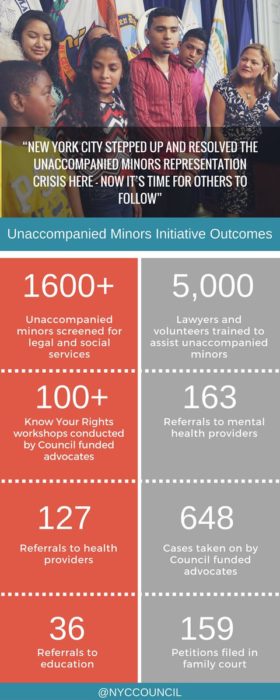This Speaker and Council are deeply committed to supporting and defending children in foster care, senior citizens, immigrants, transgender persons, those facing hunger and other New Yorkers in need. We’ve increased funding for critical services, strengthened human rights laws, and put more protections in places for survivors of domestic violence.
Youth aging out of foster care often struggle with finding permanent housing, completing high school, and seeking higher education and other government services. To address this, the Council passed legislation establishing a Foster Care Task Force, requiring the NYC Administration for Children’s Services (ACS) to submit a five-year plan to address barriers to permanent placement with a family, and requiring ACS to report on a variety of important data on youth in foster care and aging out of it.
Transgender and gender non-conforming persons can face harassment, intimidation, or worse when they attempt to use bathrooms that are associated with their gender identity. As part of the Council’s commitment to equality and dignity for all New Yorkers, we passed a law requiring single-occupant restrooms to be usable by persons of any gender – allowing transgender and gender non-conforming individuals to use the restroom that best aligns with their identity.
This Council is committed to revitalizing the City’s Human Rights Law and Human Rights Commission (HRC). In 2016, the Council expanded the Human Rights Law, allowed HRC to award attorneys’ fees in complaints brought before it, banned housing discrimination against survivors of domestic violence, and expanded the prohibition against discrimination in public accommodations, among other steps, to make New York a more fair place to live.
New York City’s senior population is the fastest growing demographic, yet the NYC Department for the Aging’s (DFTA) budget continues to be inadequate. Many seniors rely on services provided through DFTA’s network, especially those who live on fixed- or low-incomes. The Council continued to show its commitment to providing quality services for seniors in Fiscal 2017 by allocating $21.4 million toward senior services initiatives. This not only funds innovative services for niche senior populations, including Holocaust survivors and LGBTQ seniors, but also continues to provide critical support for DFTA’s core operations. The Council also successfully negotiated with the Administration to baseline an additional $1.8 million to address the case management waitlist, as well as to have the Administration fully fund all DFTA senior center space costs needs, provide congregate meals for seniors, and commit additional resources to address the homecare waitlist.
Federal cuts to the Supplemental Nutrition Assistance Program (SNAP), which reduced monthly benefits on average by $18, have created a strain on emergency food pantries across the City. Pantries have been inundated with hungry New Yorkers in need of food once their monthly SNAP benefits have run out. The Emergency Food Assistance Program (EFAP) provides a year-round supply of shelf-stable food for approximately 500 food pantries and soup kitchens throughout our city. To meet the increased demand on food pantries, the Council negotiated with the Administration to add an additional $4.9 million to the EFAP budget, which increased the City’s food procurement capacity by 40 percent.
New York’s most vulnerable residents are often targeted by con artists and unscrupulous actors. That’s why the Council passed legislation requiring the NYC Department of Consumer Affairs to provide specialized outreach and education to seniors, women, and immigrants on consumer protection issues. With 60 percent of pending immigration legal cases deemed ‘complex’ and with limited sources of funding, legal service providers are restricted and prevented from providing flexible and appropriate services to immigrant New Yorkers. To address this need, we committed to serving an additional 1,000 complex cases at a total cost of $2.7 million, increasing the Immigrant Opportunities Initiative capacity from 4,000 to 5,000 cases, including about 1,800 complex cases.
The Council successfully advocated to provide $1 million in support of legal services for unaccompanied minors who arrive in New York City. Despite the fact that many of these children have legitimate claims to relief, these young people are likely to be sent back to their home countries without legal representation.

